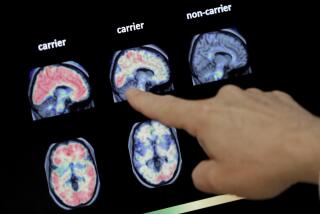HEALTH RESEARCH : Alzheimer’s Rate in Elderly Reassessed
- Share via
The percentage of Americans over age 85 with mild or severe cases of Alzheimer’s disease may be considerably higher than previously recognized, according to a study by researchers at Brigham and Women’s Hospital in Boston.
Alzheimer’s disease is “relatively common (in people) over age 85, which is the fastest-growing age group in the United States,” said Dr. Denis A. Evans, principal author of the study, published in today’s Journal of the American Medical Assn. “The implication is that we will see a public health problem of increasing magnitude from Alzheimer’s and (should) make plans to meet it.”
Alzheimer’s is the most common of a group of disorders known as dementias, which are characterized by loss of mental functions in alert and awake individuals. In the most severe cases, individuals become so incapacitated that they require around-the-clock care.
Alzheimer’s is characterized by a gradual degeneration of brain cells. Its exact cause is unknown; in general, there are no effective treatments.
The researchers studied 3,623 East Boston residents over 65 years of age, 467 of whom received detailed clinical exams. Among those over 85, the researchers estimated a 47.2% rate of “probable” Alzheimer’s disease, including mild and severe cases. Previous studies, which have focused on severe cases of the dementing illness, have estimated the prevalence of Alzheimer’s in this age group to be about 25%.
But the researchers cautioned that because of the small number of people over 85 studied, the actual prediction was very imprecise. Although their best estimate was that 47.2% of those over age 85 were affected, they said the actual number could be between 37.0% and 63.2%, the report said. About one-quarter of the people who underwent detailed clinical exams were over age 85.
The researchers’ overall estimate of Alzheimer’s disease prevalence among the elderly in East Boston was 10.3%, including 3.0% of those 65 to 74 years old and 18.7% of those 75 to 84 years old.
In an editorial on the study for the medical journal, Dr. Eric B. Larsen of the University of Washington Medical Center in Seattle called on his colleagues to be vigilant in searching for signs of dementia in the elderly and to realize that “the patient with dementia is probably at higher risk for undiagnosed but treatable coexistent medical problems.”
The National Institute of Aging, which funded the research, issued a press release on the new findings. The agency statement claimed that the new study, when combined with Bureau of Census statistics, revised the estimates of the number of over-65 Americans suffering from Alzheimer’s from 2.5 million to “close to 4 million.” In another press release, the Chicago-based Alzheimer’s Assn. urged a “stepped-up national commitment to research.”
In an interview, Evans said that the differences between the various Alzheimer’s estimates for the over-65 population were more apparent than real. “Previous estimates tended to be restricted to individuals with more severe diseases,” he said. “I do not believe our estimates are inconsistent with previous estimates.”
The study may have detected more Alzheimer’s cases at earlier stages because it recruited participants through a community survey, instead of focusing on hospitalized patients or outpatients.






